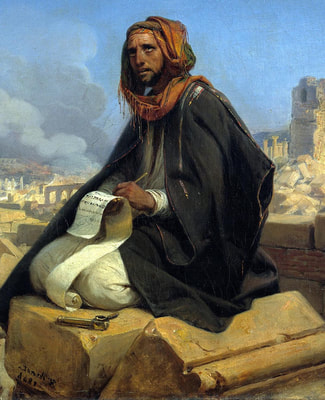
Jeremiah 1:4-10; 7:1-11, 15; 20:7-10, 14-18; 31:31-34
A bit like President Obama stood on the shoulders of Martin Luther King, Jr., Jesus stood on the shoulders of Old Testament prophets like Jeremiah. As Jesus did after him, Jeremiah lived in tough times. He criticized injustice and hypocrisy, suffered a lot for his message, and longed for God’s comforting presence. And in the end he offered hope.
Background and Call
My name is Jeremiah. I come from a little village near Jerusalem. My father, grandfather, and
great-grandfather were all priests. But I was shocked when, as a youth, God called me.
God said, “I want you to announce my message to priests and politicians and kings.” I said, “I
can’t; I’m only a boy!” God said, “Don’t worry; just speak what I command you. I will be with
you; and if you get in trouble, I’ll deliver you. Your words will be my words, and they will
concern the destruction and rebuilding of nations! (ch. 1)
This was a love-hate calling; sometimes I loved God’s call, and sometimes I hated it. You see,
society was in turmoil. Josiah, our king, had led a religious revival in our little land of Judah,
and many people turned to the true God of Abraham and Sarah. But then he was killed by the
Egyptian army, and it was downhill ever since. Egypt was a superpower, and we fell totally
under Egypt’s control.
Josiah’s son, Jehoiakim, came to the throne, but he was disaster. He bled the economy dry
building big palaces, paid enormous taxes to Egypt, turned Judah’s foreign policy towards Egypt,
and brought in Egypt’s gods. And our people – the same ones who had turned to God under
Josiah – now turned to Egypt’s gods!
Babylon coming!
The other superpower was Babylon, where Iraq is today. Egypt and Babylon went to war to
determine who would be #1 in the Middle East. Babylon smashed the Egyptian army and chased
them south right through Judah and all the way back to Egypt. And on the way, Babylon told us
in Judah: you’d better forget about Egypt and surrender to Babylon if you want to survive at all,
or we’re going to wipe you right off the map.
Well, I prayed a lot about this, and what I heard from God was something like this: “Judgment is
coming, and it’s coming through Babylon. Go, look in Jerusalem, among the rich, among the
poor; you will find not one righteous person (ch. 5). The people steal, murder, commit adultery,
swear falsely, and chase after Egyptian gods (ch 7). They release their slaves as the Law of
Moses commands, but then take them all back again” (ch 34).
“And then – they come stand in my holy temple and say: we are safe, we are safe, for this is
God’s house. What hypocrites! They have turned my house of worship into a den of robbers!
(ch 7). And so, thru Babylon, I, God, will devastate Judah, Jerusalem, and the temple, and
deport all of Judah’s leaders to Babylon. Jeremiah, go warn them of this; perhaps some may yet
return to Me.”
So I began preaching: Return to the true God, and surrender to Babylon, or else Jerusalem and
the temple will fall, and all you religious and political leaders will be carried away to Babylon.
People’s Responses
This was not what the people wanted to hear! “You’re a traitor!” they said. My friends and even
my family members rejected me (ch 11). In the temple the chief priest locked me in stocks like a
thief (ch 20). King Jehoiakim banned me from the temple altogether.
Once I just had to get God’s message in to the king, so I sent my secretary to read it to him. As
my secretary read the words, the king cut out the words with his knife and threw them into the
fire (ch 36). I was so furious that I said to my secretary, “We will do this all over again.” So he
sat down with his pen and paper, and I spoke all these words again – and quite a bit more. This
second expanded edition, by the way, is what is in our Bibles today.
Deportation and the Cistern
Well, the king, the priests, the politicians, and the anti-Babylon nationalists were all wrong, and I
was right. One day the Babylon army marched into Jerusalem, killed king Jehoiakim, deported
thousands to Babylon, and placed a puppet, Zedekiah, on the throne.
Meanwhile, those who still favored Egypt threw me into a deep cistern with the hope that I
would die there (ch 38). Thank God the African Ebed-Melech and his friends pulled me out.
Jeremiah’s Confessions
Now, how do you think I felt? How would you feel if your family rejected you, your friends
shunned you, religious leaders wanted to kill you, political leaders threw you into a pit to die,
and you were accused of being a traitor and lying about God’s message?
I was angry at my abusers, who in their resistance to Babylon, drove our beloved land to
destruction. Sometimes I wanted to kill them! (ch 18). I was also depressed. Since my family
and friends rejected me, the only one I could talk to was God. I poured my heart out: “Didn’t
you say, God, ‘I will be with you? If you get in trouble, I will deliver you?’ Well, God, where
were you?”
These were some of my words (ch 20):
“O Lord, you have seduced me, and I was seduced.
You have overpowered me, and you have prevailed.
I am a laughing stock all day long; everyone mocks me….
Cursed be the day I was born!
Why did I come forth from the womb – only to toil and sorrow, and spend my days in shame?”
I was so upset that I wanted to die. But I couldn’t quit. It was like there was fire in my bones,
and I just had to keep on preaching (ch 20). Good thing God was there to complain to; God sure
got an earful sometimes. Actually, I think God appreciates our honesty.
Fall of Jerusalem
In the end, the worst happened. Zedekiah, our puppet king, sided with Egypt again. Before long
the Babylonian army arrived for the second time. This time they destroyed everything – the
walls, the buildings, the temple – everything.
But Babylon treated me well. Since I’d been preaching surrender, they gave me the choice to go
with them to Babylon or to stay in Jerusalem. Of course I chose to stay with my people, even if
the city was destroyed.
Hope
Then a strange thing happened. Before Jerusalem fell, I felt weak, alone, rejected. But now,
after the city and temple were destroyed, people started coming to me. “Jeremiah, what shall we
do? There’s no food, no water, no work, and our children are gone. Is there any hope?”
And then I began to get letters all the way from Babylon: “Jeremiah, we’re so lost and lonely out
here, and in so much pain (see Psa. 137). Is there any hope for us?”
I prayed a lot about this, and what I heard from God was a big “Yes, there is hope!” God said,
“Go buy some land” (ch. 32), even though in wartime it was worthless. So I went and bought
land. Why? It was a sign to the people: This land will blossom again!
For the people God said (ch 31):
I have loved you with an everlasting love; . . .
Again you shall plant vineyards…;
The planters shall plant, and shall enjoy the fruit . . . .
I will turn their mourning into joy,
I will comfort them, and give them gladness for sorrow (31:3-5, 13).
And another message for the people:
The days are surely coming,… when I will make a new covenant with the house of Israel and
the house of Judah.
It will not be like the covenant which I made with their ancestors when I . . . brought them out
of . . . Egypt – a covenant which they broke….
But this is the covenant that I will make…
I will put my law within them, and I will write it – not on tablets of stone, but on their hearts;
And I will be their God and they shall be my people. . . .
They shall all know me, from the least of them to the greatest,…;
For I will forgive their wickedness, and remember their sin no more (31:31-34).
With God there is always hope; the last word is always good news. After pain and loss and grief
come hope and new life. No matter how deep our distress and despair, how serious our sin, or
how painful our grief – with God a fresh start is possible for you, for me, for the world.

 RSS Feed
RSS Feed

